Last updated on May 23rd, 2023 at 11:14 am
Why Fish Oil?
If you’re here you may already be taking fish oil or you may be new to fish oil altogether so feel free to skip ahead if you’re an experienced fish oil aficionado. If you’re new to fish oil let’s start from the beginning.
Fish oil is a major source of Omega-3 fatty acids. Omega-3 fatty acids are considered “essential” because your body doesn’t produce them on its own. In other words, you need to consume these particular fatty acids from food and/or nutritional supplements. The major providers of Eicosapentaenoic acid (EPA) and docosahexaenoic acid (DHA) in the human diet are fish. Unfortunately, eating large amounts of fish is a growing health concern due to noxious heavy metals and environmental toxins that tend to accumulate in marine ecosystems. So many people, myself included take a fish oil supplement regularly.
Omega 3’s can influence more than just heart health. As you can see from the chart below Omega 3’s can influence cognitive function, eye health, joint health, cardiovascular health and may even help to have a healthy mood. Let’s jump into the potential benefits further and we’ll link to the applicable health research behind it.
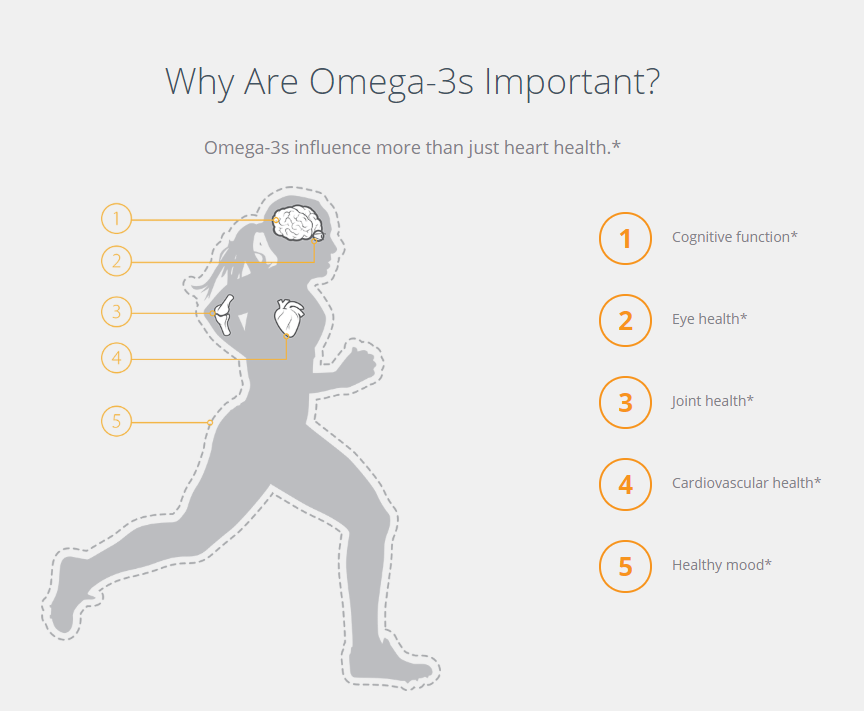
Support For Health Cardiovascular & Immune Function
Heart disease is the leading cause of death in America today. 1 Heart disease is a complex issue and fish oil alone won’t solve heart disease but combined with a healthy diet and exercise it can help. Research consistently shows that DHA and EPA are some of the strongest natural promoters of a healthy cardiovascular system and supporters of healthy immune function.2 Clinical research has shown that patients supplementing with a highly concentrated fish oil supplement produced nearly 70% less inflammatory biomarkers than those who didn’t take fish oil.3 With regard to the body’s immune response there is a body of research that’s showing that concentrated (or fractionated) fish oil may help the body heal faster because it contains Specialized Pro-Resolving Mediators. You can read our article “Firefighters of the Body – Specialized Pro-Resolving Mediators” if you’d like to learn more.
Musculoskeletal Support
Aging takes a toll on the skeletal system and as we age, our joints are exposed to biomechanical and physiological stress through things like exercise and daily activity. As joints and cartilage lose integrity, your body naturally produces more inflammatory biomarkers (which can lead to joint discomfort). Research suggests that supplementing with EPA and DHA may help with joint discomfort and support joint health.4
Skin Health & Vitality
The DHA and EPA in fish oil are postulated to be the primary anti-inflammatory nutrients for skin tissue.5 Research shows that regular use of a fish oil supplement promotes healthy signaling cascades in the skin.6 DHA and EPA also appear to support healthy oxidative stress in skin tissue.7
Cognitive Support
EPA and DHA supplementation has been shown to significantly promote cognitive health.8 DHA and EPA are integral components of neuron membrane phospholipids (think a major component of all cell membranes), thereby supporting cognitive function.
So now that we’ve talked about Fish Oil’s benefits how much do we need and how can we find a supplement that’s got all the right stuff without any of the bad stuff? Let’s start with the question of how much do we need?
Omega 3’s – How Much Do We Need?

This is something that’s specific to the individual and should be discussed with your nutritionist or doctor who knows you best and can take into account anything specific to you and your medical history. As a general rule The World Health Organization and Consumer Lab both recommend 500 mg combined EPA and DHA for a minimum daily dose. Research suggests that a combined intake of EPA and DHA between 1000-3000 mg per day (in a 3:2 ratio of EPA:DHA) is more effective to support health and longevity.10 Please consult your healthcare practitioner to see what’s right for you.
How Do We Know If It’s Pure and Safe?
Purity Testing & Manufacturing Certification
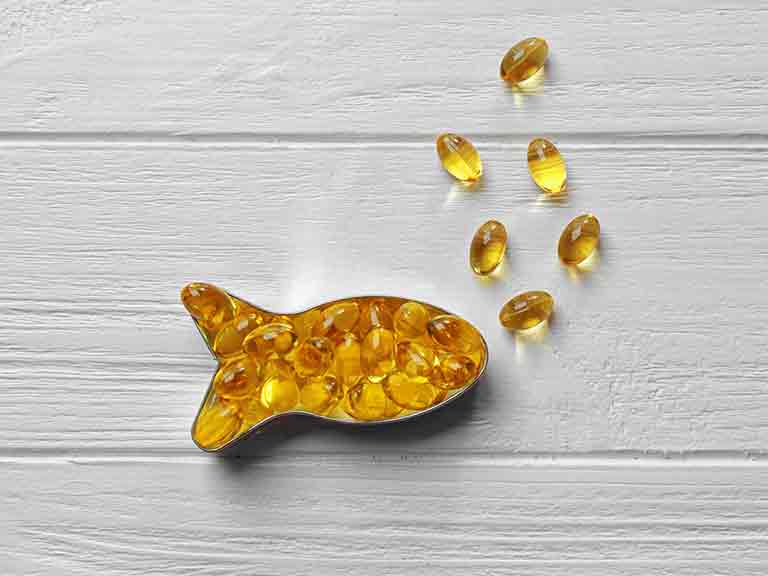
You want to make sure the fish oil you are buying has been purity tested and is manufactured in a facility certified by the FDA’s (CGMP) regulations.9 The good news here is all the supplements we’ll suggest below meet the standard. Third party purity testing is also key to ensuring the fish oil meets or exceeds international quality standards. Here’s an example of a purity test from Nordic Naturals. Every brand we suggest below has extensive purity testing.
Potency:
- Testing to verify fatty acid content matches what is listed on the label—EPA, DHA, and other omega fatty acids such as omega-6s.
- Rancidity potential (oxidative measures): Testing to ensure freshness has not been compromised by exposure to air, heat, light, and metals during manufacture, which can affect taste and smell.
- Environmental contaminants & heavy metals: Purity testing for the presence of environmental toxins and industrial chemicals.
- Dioxins & furans
- Polychlorinated biphenols (PCBs)
- Dioxin-like PCBs
- Heavy metals (lead, tin, cadmium, mercury, arsenic)
- Other industrial metals (iron, copper)
- Iodine 131
Reputable third-party laboratories offer reliable, analytical methods for characterizing the identity, purity, composition, and authenticity of fish oil formulas. Be sure to look for a quality guarantee with verified testing information that ensures the highest level of purity possible. As someone once said if you suspect a bad fish oil, remember: There are plenty of other fish in the sea.
Fish Oil Recommendations
Based on all of the criteria above and popularity with our customers here are the top fish oil supplements. It might be easy to be overwhelmed by the choices. It’s important to talk to your doctor or nutritionist about what would be right for your personal situation and or medical history. With most adults we see many people order Omega Pure 720’s, ProOmega (either regular or ProOmega 2000 depending on dosing needs), OmegaGenics 500’s or 720’s. Remember the 500 Enteric Coated can be great for those wanting to minimize any fishy burps or aftertaste.
For those wanting a non-fish source of Omega’s Algae-based oils are very popular (Nordic Naturals Algae Omega or OmegaGenics 300 Algae.)
Nutridyn Omega Pure
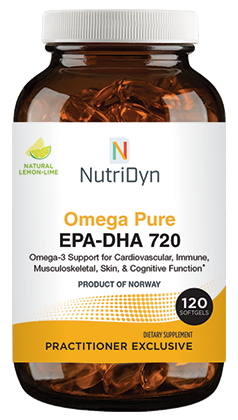
Nutridyn’s Pure Omega is my personal fish oil of choice. It comes in a wide variety of forms and Nutridyn has very stringent manufacturing and purity testing to ensure the EPA and DHA are at the levels the label says they are without harmful chemicals or toxins. The oil is stabilized with antioxidants and after a few days I did not experience any fishy taste.
| 300 (270 Count) | EPA = 360mg | DHA = 240mg | Other = 100mg |
| 600+ (120 Count) | EPA = 800mg | DHA = 400mg |
| 720 (120 or 240) | EPA = 860mg | DHA = 580mg | Other = 160mg |
| 1000 (120 Count) | EPA = 730mg | DHA = 270mg | Other = 100mg |
| 2400 (Liquid – 150mL) | EPA = 1,410mg | DHA = 990mg | Other = 400mg |
Nordic Naturals Pro Omega
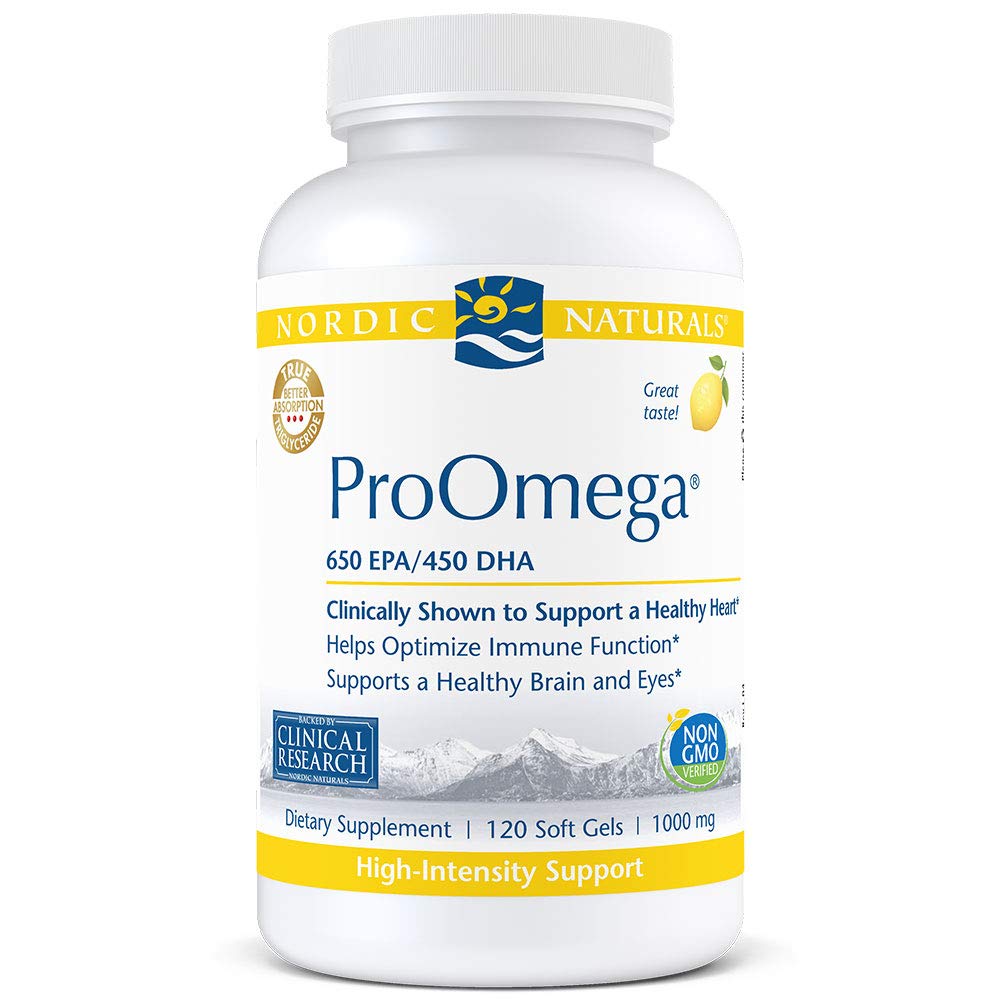
Nordic Naturals has been my personal go-to for a long time until I recently switched over to try Nutridyn’s Omega Pure. Nordic Naturals is a long-standing name that continues to stand for high quality, purity tested and sustainably harvested fish oil. Our customers love the product. It comes in the following varieties
| ProOmega 60 | 120 | 180 | EPA = 650mg | DHA = 450mg | Other = 180 |
| ProOmega 2000 (60 or 120) | EPA = 1125mg | DHA = 875mg | Other = 150 |
Metagenics OmegaGenics
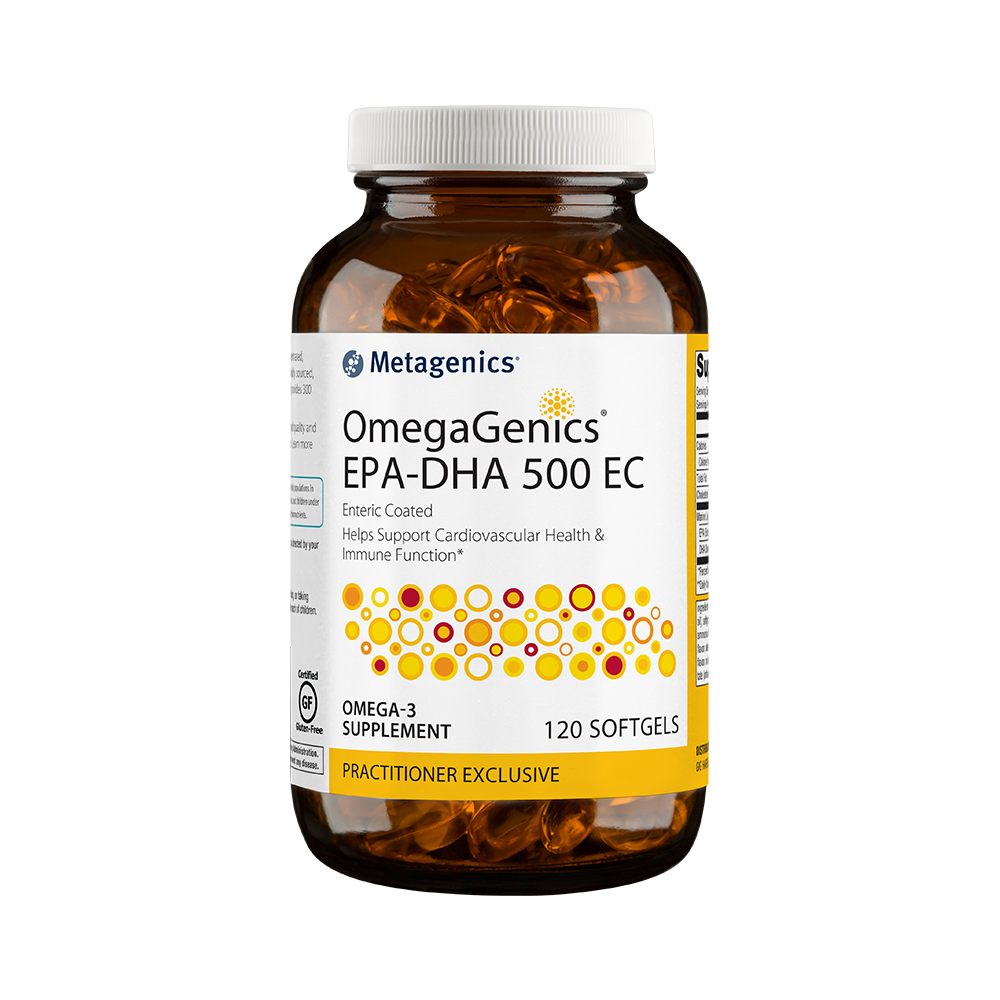
Metagenics OmegaGenics features a wide range of sizes and forms of Omega-3 Fish oils including both liquids and softgels. One unique thing about the OmegaGenics Fish Oil line is that they have an Enteric Coated option that helps to stop any fishy burps or aftertaste by ensuring the fish oil is digested further down in the intestinal tract via the protective enteric coating. Also nice is that a portion of all Metagenics Fish Oil sales goes to support Vitamin Angels which provides nutrition around the world to those who would normally not be able to get it.
| 300 (270 Count) | EPA = 240mg | DHA = 360mg | Other = 100 |
| 300 Algae (60 Count) | EPA = 180mg | DHA = 360mg | Other = 60 |
| 500 Enteric (120 or 240) | EPA = 600mg | DHA = 400mg |
| 500 (120 or 240) | EPA = 600mg | DHA = 400mg |
| Advanced Support | |
| 720 (60 or 120 or 240) | EPA = 860mg | DHA = 580mg | Other = 160 |
| Alaskan CLO (6.67 FL Oz) | EPA = 425mg | 425 = 360mg | DPA = 45mg |
| 1000 (60 or 120) | EPA = 710mg | DHA = 290mg | Other = 100 |
| Targeted Support | |
| Mega 10 + Omega 7 Oil (60) | EPA = 330mg | DHA = 170mg | Other = 60 |
| EPA 1200 (60 or 90) | EPA = 1200mg |
| 2400 Liquid (5 FL Oz) | EPA = 1410mg | DHA = 990mg | Other =400 |
| Metakids DHA (120) | EPA = 20mg | DHA = 100mg | Other = 280 |
| Neuro 1000 (60) | EPA = 750mg | DHA = 250mg |
NOTHING IN THIS WEBSITE IS INTENDED AS, OR SHOULD BE CONSTRUED AS, MEDICAL ADVICE. ANY HEALTHCARE AND/OR NUTRITIONAL MATERIAL CONTAINED IN THIS WEBSITE IS FOR CONSUMER INFORMATIONAL AND EDUCATIONAL PURPOSES ONLY. SUCH MATERIAL IS NOT INTENDED AS MEDICAL ADVICE FOR CONDITIONS OR TREATMENT, NOR IS IT INTENDED AS A SUBSTITUTE FOR A MEDICAL EXAMINATION BY A HEALTHCARE PROFESSIONAL. CONSUMERS SHOULD CONSULT THEIR OWN HEALTH CARE PROFESSIONALS FOR INDIVIDUAL MEDICAL RECOMMENDATIONS.
References
1. Heart Disease Facts – Centers For Disease Control and Prevention – https://www.cdc.gov/heartdisease/facts.htm
2. Kelley, D. S., Siegel, D., Fedor, D. M., Adkins, Y., & Mackey, B. E. (2009). DHA supplementation decreases serum C-reactive protein and other markers of inflammation in hypertriglyceridemic men. The Journal of nutrition, 139(3), 495-501.
3. Ebrahimi, M., Ghayour-Mobarhan, M., Rezaiean, S., Hoseini, M., Parizade, S. M. R., Farhoudi, F., … & Shakeri, M. T. (2009). Omega-3 fatty acid supplements improve the cardiovascular risk profile of subjects with metabolic syndrome, including markers of inflammation and auto- immunity. Acta cardiologica, 64(3), 321-327.
4. Kremer, J. M., Lawrence, D. A., Petrillo, G. F., Litts, L. L., Mullaly, P. M., Rynes, R. I., … & Bigaouette, J. (1995). Effects of high-dose fish oil on rheumatoid arthritis after stopping nonsteroidal antiinflammatory drugs clinical and immune correlates. Arthritis & Rheumatism, 38(8), 1107-1114
5. Danno, K., Ikai, K., & Imamura, S. (1993). Anti-inflammatory effects of eicosapentaenoic acid on experimental skin inflammation models. Archives of dermatological research, 285(7), 432-435.
6. Boelsma, E., Hendriks, H. F., & Roza, L. (2001). Nutritional skin care: health effects of micronutrients and fatty acids–. The American journal of clinical nutrition, 73(5), 853-864.
7. Zouboulis C, Saborowski A, Boschnakow A: Zileuton, an oral 5-lipoxygenase inhibitor, directly reduces sebum production. Dermatology. 2005, 210: 36-8. 10.1159/000081481
8. Kidd, P. M. (2007). Omega-3 DHA and EPA for cognition, behavior, and mood: clinical findings and structural-functional synergies with cell membrane phospholipids. Alternative medicine review, 12(3), 207.
9. FDA CGMP Manufacturing Standards – https://www.fda.gov/drugs/pharmaceutical-quality-resources/current-good-manufacturing-practice-cgmp-regulations
10. Kris-Etherton, P. M., Grieger, J. A., & Etherton, T. D. (2009). Dietary reference intakes for DHA and EPA. Prostaglandins, Leukotrienes and Essential Fatty Acids, 81(2), 99-104.
- Magnesium Threonate: An Honest Buying Guide for Health Enthusiasts - March 21, 2024
- Magnesium Citrate Vs Glycinate: 5 Key Differences And Benefits - March 14, 2024
- How to Pick the Best Magnesium Glycinate Supplement for You - March 7, 2024





Hi, just wanted to say, I enjoyed this post. It was practical. Fedora Grove Julia